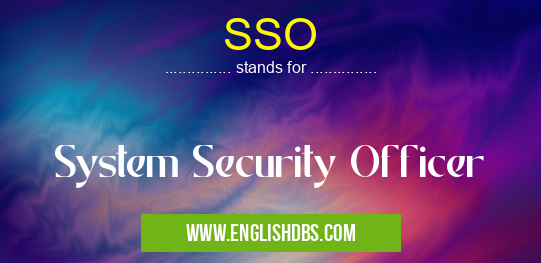What does SSO mean in OCCUPATION & POSITIONS
SSO stands for System Security Officer and is the designated individual or team responsible for building, implementing, maintaining, and monitoring the security of an organization's systems. The SSO focuses on protecting data from unauthorized use by malicious actors while limiting access to authorized users. This includes managing access control for applications and systems, ensuring secure configurations and software updates are in place, as well as developing data recovery plans in the event of attacks or other disasters. SSOs must take a proactive approach to security with a focus on risk management and compliance with standards such as ISO 27001.

SSO meaning in Occupation & Positions in Business
SSO mostly used in an acronym Occupation & Positions in Category Business that means System Security Officer
Shorthand: SSO,
Full Form: System Security Officer
For more information of "System Security Officer", see the section below.
Essential Questions and Answers on System Security Officer in "BUSINESS»POSITIONS"
What is a System Security Officer?
A System Security Officer (SSO) is a cybersecurity professional responsible for the overall security of a company's information systems. They create and maintain security policies and procedures, ensure compliance with all relevant laws and regulations, and monitor networks for security vulnerabilities.
What are an SSO's key responsibilities?
An SSO is typically responsible for maintaining the confidentiality, integrity, and availability of business information systems. This includes tasks such as identifying security risks, developing controls to mitigate those risks, implementing access control measures, detecting and responding to cyberattacks, managing user accounts and data backups, overseeing system updates and upgrades, staying up-to-date on evolving cybersecurity trends, and educating employees on best online safety practices.
How often should an SSO be updated on current trends in cyber security?
An SSO should strive to stay informed about emerging threats in the rapidly evolving field of cyber security. This involves regularly reading reports from government agencies such as the US-CERT or Department of Homeland Security; attending webinars or online lectures hosted by industry experts; participating in discussions at industry conferences; researching new tools and strategies; receiving alerts from external threat intelligence services or monitoring tools; engaging in peer-reviews with other professionals; or taking classes offered by academic institutions.
When should an SSO review existing security policies?
An SSO should review existing security policies regularly to make sure they are still effective. This includes making changes to policies based on new technologies that become available or shifts in corporate priorities. It is important to keep policies up-to-date so that they can remain effective against changing threats and fit the demands of any given organization.
What are some common mistakes made by System Security Officers during implementation?
Common mistakes made by System Security Officers during implementation can include failure to conduct sufficient risk assessments prior to deployment, inadequate configuration management planning which may cause problems later down the line after updates or upgrades take place, failing to document all procedures related to network administration tasks which can create confusion if personnel changes occur later on, neglecting to address employee training requirements which can result in poor end user behavior which jeopardizes organizational security posture; or failing to build sufficient processes into automated systems resulting in a lack of oversight over automated tasks that could potentially be exploited by malicious actors.
Should an SSO utilize third party services?
Yes - experienced System Security Officers will often rely upon third party service providers when it comes time for infrastructure assessment & maintenance activities such as vulnerability scanning/patching management activities or installing specialized hardware/software solutions that increase organizational resilience against cyberattacks & potential data loss incidents. Doing so allows one individual (the SSO) accesses resourceful software applications & utilities not usually available within their own IT departments without having to invest time & resources into developing something similar.
Is it necessary for an SSO oversee network traffic & user activities?
Yes – it is important for a System Security Officer (SSO) maintains oversight over both network traffic & user activities in order to ensure that business operations remain secure while internal users enjoy safer experiences when conducting digital transactions across multiple platforms. Additionally this helps identify system weaknesses quickly as well as track suspicious activity that could indicate malicious intent.
What type of feedback does an SSO need from other stakeholders?
To properly assess & manage an organization’s information systems its necessary for the System Security Officer (SSO) gathers feedback from various stakeholders whenever possible regarding ongoing projects & initiatives being undertaken within their departments by soliciting written reviews , inviting certain team members discuss their equipment purchases/implementations plans with him/her or consulting other IT staff members representing different areas like application development , database architecture , etc.
Final Words:
In summary, an SSO plays a critical role in safeguarding an organization’s data from malicious actors by proactively monitoring their networks and systems for potential vulnerabilities while simultaneously ensuring compliance with relevant regulations. They must have a deep understanding of both technical aspects such as authentication protocols along with soft skills like communicating cyber hygiene best practices effectively among employees in order to keep networks safe from external threats.
SSO also stands for: |
|
| All stands for SSO |
